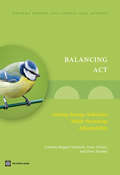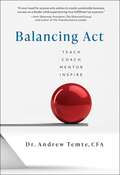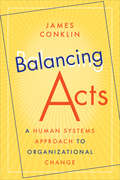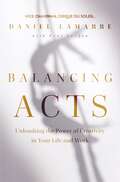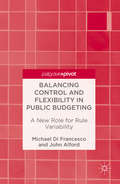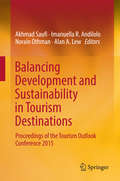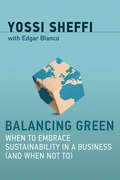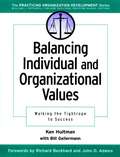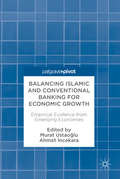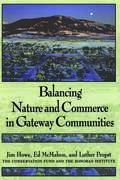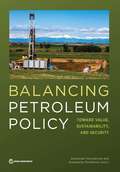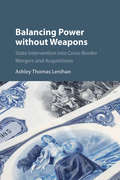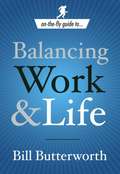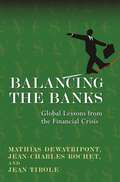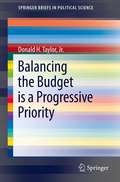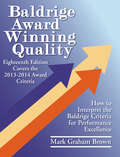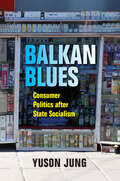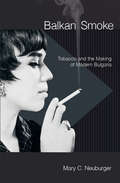- Table View
- List View
Balancing Act: Cutting Energy Subsidies while Protecting Affordability
by Caterina Ruggeri Laderchi Anne Olivier Chris TrimbleIn Eastern Europe and Central Asia there are significant pressures for residential energy tariffs to rise, as government budgets are increasingly stretched and cannot afford to pay large energy subsidies. Further pressures for tariffs to rise come from environmental concerns, as the tariff levels that households now face do not cover the social costs of energy production. Because reforms that would increase energy tariffs are likely to affect significantly the poor and the middle class, their political feasibility may be questioned unless appropriate ways of cushioning the impacts can be devised. Balancing these competing claims-fiscal and environmental concerns on the one hand, affordability and political economy concerns on the other-is a task that policy makers in the region are increasingly unable to put off. While challenging, the reforms needed for this balancing act can build on much that has been learned in the last decade in terms of improving the effectiveness of social assistance systems and increasing energy efficiency. This report suggests that a policy agenda that focuses on cutting subsidies to the energy sector, while investing in energy efficiency and supporting households at the bottom of the distribution, amounts to a new wave of policy reforms for the energy sector in transition countries. The feasibility of such an integrated policy agenda and the ability of these policies to balance the competing claims of fi scal responsibility and social concerns are explored through different policy scenarios, which, in their simplicity, help clarify the parameters of the policy choices many countries ECA are facing. This report is a part of a series of 3 regional reports. The series includes Growing green: The economic benefits of climate action in Europe and Central Asia, Balancing act: Cutting energy subsidies and protecting affordability and Lessons learned from energy efficiency success cases.
Balancing Act: Deborah Lovich (A)
by David G. Fubini Patrick SanguinetiDeborah Lovich, Partner at the Boston Consulting Group (BCG), has been given the opportunity of a lifetime: to join the firm's Executive Committee as its youngest member and only current woman, as well as just the second woman in its history. Encouraged by her mentors, she saw this role as an important platform to help shape BCG's future. Yet, she had family to consider. Taking up the opportunity would add an additional five to six weeks of travel per year, on top of an already hectic schedule that kept her from home and her four children most days of the week. Her husband Mark, who had finished a grueling 12-year MD-PhD program one year earlier, decided to put his career on hold to be a stay-at-home dad because of her many commitments. Now, with the possibility of even further time away from the family looming, and the kids wanting more time with her, Mark made a serious demand: that she not only decline the Executive Committee role, but also scale back her commitments so that he could relaunch his career. Lovich must weigh how to balance her responsibilities to her family without sacrificing the career she had worked so hard to build.
Balancing Act: Deborah Lovich (B)
by David G. Fubini Patrick SanguinetiThis case provides updates on Deborah Lovich's decision and how she navigated her work and family responsibilities over the following decade.
Balancing Act: Deborah Lovich (C)
by David G. Fubini Patrick SanguinetiThis case provides further updates on Deborah Lovich's decision, as well as reflections from her family and mentors on her path.
Balancing Act: Strategy, Organizations, and Control
by Robert L. SimonsThis chapter introduces the tensions that arise in attempting to align organizations, business strategy, and human behavior. Balancing these tensions is at the heart of implementing strategy.
Balancing Act: Teach Coach Mentor Inspire
by Andrew Temte"I believe the most important attribute of strong leadership is balance." So states Andrew Temte in this reflective and uniquely candid look at the capabilities managers and aspiring managers need in today&’s workplace. The last 10-20 years have led to a tectonic shift in the leadership traits required by businesses as they navigate increased customer demands for transparency and alignment with shared values. Covering a wide range of topics, from promoting lifelong learning to combatting organizational entropy, Balancing Act is the story of a personal journey towards continuous self improvement.
Balancing Acts: A Human Systems Approach to Organizational Change
by James ConklinBalancing Acts is about organizational change. It offers consultants and managers a simple, powerful way to think about change, and describes a four-phase iterative process for implementing change. The book is full of examples of change initiatives in different types of organizations, and confronts head-on the problems and pitfalls that often arise. Conklin explains why organizational change can be so difficult, and shows that by balancing a set of competing psychological and systemic challenges interveners will increase their chance of success. Conklin shows that human groups function as complex systems, and that a change initiative is not a linear progression toward a predefined conclusion. Instead, change is an iterative process that involves a search for feasible and useful solutions. The book’s central argument is that while leading or supporting this search, consultants and leaders must balance four critical concerns. They must balance confrontation with compassion, participation with observation, assertion with inquiry, and planfulness with emergence.
Balancing Acts: Unleashing the Power of Creativity in Your Life and Work
by Daniel LamarreAre you prepared to take the risks necessary to drive innovation and champion an environment of over-the-top invention? Cirque du Soliel CEO Daniel Lamarre shares what it takes for anyone, regardless of position or industry, to embrace the value of creative leadership.At the core of Cirque du Soliel&’s lavish, multi-million-dollar productions is President and CEO Daniel Lamarre, who has mastered the ability to bring business and creativity together across multiple languages and cultures in a way that has never been seen before. The secrets he shares in Balancing Acts are rooted in tremendous faith in your own creative skills and those of the sharpest minds within your organization.Through Daniel&’s story triumph and trials, you&’ll learn:How to shatter the perceived limitations standing in the way of your ability to think creatively and innovatively;When to step up and when to step back so that your team can create a masterpiece that doesn&’t break the bank;How, in using the methods Daniel has uncovered, modern companies with entrenched bureaucracies can bring creativity and business together to foster innovation and boost profits; andHow to use creative thinking to lead your organization to new heights.Whether you work for one of the most creative organizations on the planet like Cirque du Soleil; in a stuffy corporate job; or somewhere in between—Balancing Acts is filled with principles that can strengthen and accelerate any business on the planet.
Balancing Control and Flexibility in Public Budgeting: A New Role for Rule Variability
by Michael Di Francesco John AlfordThis work explores how reshaping budget rules and how they are applied presents a preferred means of public sector budgeting, rather than simply implementing fewer rules. Through enhanced approaches to resource flexibility, government entities can ensure that public money is used appropriately while achieving the desired results. The authors identify public budgeting practices that inhibit responses to complex problems and examine how rule modification can lead to expanded budget flexibility. Through a nuanced understanding of the factors underlying conventional budget control, the authors use budget reforms in Australia to show the limits of rule modification and propose "rule variability" as a better means of recalibrating central control and situational flexibility. Here, policy makers and public management academics will find a source that surveys emerging ways of reconciling control and flexibility in the public sector. iv>
Balancing Development and Sustainability in Tourism Destinations: Proceedings of the Tourism Outlook Conference 2015
by Alan A. Lew Akhmad Saufi Imanuella R. Andilolo Norain OthmanThis book contains 35 papers from the Tourism Outlook Conference held in Lombok, Indonesia in July 2015. The book presents comprehensive discussions on sustainability in the tourism industry. It includes research on various constituents of the tourism sector and analyses of each of them from a sustainability standpoint. Case studies that are global in nature are presented to show how sustainable applications can be used and how concerns can be addressed. The book is a response to rapid change in contemporary tourism trends brought about by global economic and social forces such as development pressures, population growth, major resource extraction, industrial fishing, global climate change and steadily rising sea levels. Balancing Development and Sustainability in Tourism Destinations serves as a platform for students and educators, government agency employees, hospitality and tourism industry practitioners, public and private land managers, community development workers, and others interested in identifying practical solutions, charting new directions, and creating opportunities for sustainable tourism development.
Balancing Green: When to Embrace Sustainability in a Business (and When Not To) (The\mit Press Ser.)
by Yossi SheffiAn expert on business strategy offers a pragmatic take on how businesses of all sizes balance the competing demands of profitability and employment with sustainability.The demands and stresses on companies only grow as executives face a multitude of competing business goals. Their stakeholders are interested in corporate profits, jobs, business growth, and environmental sustainability. In this book, business strategy expert Yossi Sheffi offers a pragmatic take on how businesses of all sizes—from Coca Cola and Siemens to Dr. Bronner's Magical Soaps and Patagonia—navigate these competing goals. Drawing on extensive interviews with more than 250 executives, Sheffi examines the challenges, solutions, and implications of balancing traditional business goals with sustainability. Sheffi, author of the widely read The Resilient Enterprise, argues that business executives' personal opinions on environmental sustainability are irrelevant. The business merits of environmental sustainability are based on the fact that even the most ardent climate change skeptics in the C-suite face natural resource costs, public relations problems, regulatory burdens, and a green consumer segment. Sheffi presents three basic business rationales for corporate sustainability efforts: cutting costs, reducing risk, and achieving growth. For companies, sustainability is not a simple case of “profits versus planet” but is instead a more subtle issue of (some) people versus (other) people—those looking for jobs and inexpensive goods versus others who seek a pristine environment. This book aims to help companies satisfy these conflicting motivations for both economic growth and environmental sustainability.
Balancing Individual and Organizational Values: Walking the Tightrope to Success
by Ken Hultman Bill GellermannCreate a healthy and successful organization environment! It s time to re-examine your organization s fundamental values and create the conditions necessary to make your workplaces healthier environments for everyone. This essential resource is filled with critical information needed to understand the interrelationship between individual and organizational values. Balancing Individual and Organizational Values: * Explores the major value challenges in today s business world * Offers powerful tools for assessing values * Outlines a systematic approach for revitalizing organizations through growth values
Balancing Islamic and Conventional Banking for Economic Growth: Empirical Evidence from Emerging Economies
by Murat Ustaoğlu Ahmet İncekaraThis Palgrave Pivot empirically analyzes the role of conventional and interest-free Islamic banking in the growth process of developing Islamic nations. After explaining the theoretical background of this dual banking system structure, the book then empirically analyzes growth in a variety of sectors - such as agriculture, manufacturing, and tourism - in the predominantly Muslim countries of Turkey, Malaysia, Indonesia, and Qatar. Finally, the book concludes with a detailed comparison of policy efficiency surrounding the dual bank structure, providing advice from more successful countries that can be applied to those still struggling to find a balance.
Balancing Liberty and the Pursuit of Well-Being: What Can Be Done about the Free Market's Tendency to Exploit Human Weakness?
by Peter A. UbelAccording to behavioral scientist and physician Peter Ubel, we humans are not as rational as some libertarians would have us believe, and, therefore, the free market often puts us in a position to harm ourselves. To make matters worse, the free market often rewards those people who understand consumer behavior well enough to exploit our weaknesses. Because the free market fails to protect consumer interests, a good government should find appropriate ways to protect us from ourselves. But figuring out how to balance our desire for freedom with the pursuit of happiness is no easy task. This chapter is excerpted from "Free Market Madness: Why Human Nature Is at Odds with Economics--and Why It Matters."
Balancing Nature and Commerce in Gateway Communities
by Edward T. Mcmahon Luther Propst Jim HoweIncreasing numbers of Americans are fleeing cities and suburbs for the small towns and open spaces that surround national and state parks, wildlife refuges, historic sites, and other public lands. With their scenic beauty and high quality of life, these "gateway communities" have become a magnet for those looking to escape the congestion and fast tempo of contemporary American society.Yet without savvy planning, gateway communities could easily meet the same fate as the suburban communities that were the promised land of an earlier generation. This volume can help prevent that from happening.The authors offer practical and proven lessons on how residents of gateway communities can protect their community's identity while stimulating a healthy economy and safeguarding nearby natural and historic resources. They describe economic development strategies, land-use planning processes, and conservation tools that communities from all over the country have found effective. Each strategy or process is explained with specific examples, and numerous profiles and case studies clearly demonstrate how different communities have coped with the challenges of growth and development. Among the cities profiled are Boulder, Colorado; Townsend and Pittman Center Tennessee; Gettysburg, Pennsylvania; Tyrrell County, North Carolina; Jackson Hole, Wyoming; Sanibel Island, Florida; Calvert County, Maryland; Tuscon, Arizona; and Mount Desert Island, Maine.Balancing Nature and Commerce in Gateway Communities provides important lessons in how to preserve the character and integrity of communities and landscapes without sacrificing local economic well-being. It is an important resource for planners, developers, local officials, and concerned citizens working to retain the high quality of life and natural beauty of these cities and towns.
Balancing Petroleum Policy: Toward Value, Sustainability, and Security
by Alexander Huurdeman Anastasiya RozhkovaPetroleum discovery in a country presents its policy makers with a challenging and complex task: formulating and agreeing on policies that will shape the country’s petroleum sector and guide the translation of the newly discovered resources into equitable and sustainable economic and social growth for the nation over the long term. Balancing Petroleum Policy provides policy makers and other stakeholders with the basic sector-related knowledge they need to embark on this task. It introduces a number of topics: the petroleum value chain and pivotal factors affecting value creation, a consultative process for developing a nation’s common vision on key petroleum development objectives, design of a legislative and contractual framework, petroleum fiscal regimes and their administration, prudent fiscal management, transparency and governance, environmental and social safeguards, and economic diversification through industrial linkages. Although much of the material is relevant to designing policies for the development of the petroleum sector in general, the book gives special focus to developing countries, countries in a federal or devolved setting, and countries that have experienced or are still experiencing civil conflict. With this focus in mind, the book examines three questions—ownership, management, and revenue sharing of petroleum resources—that are central to petroleum policy in any federal or devolved state. It also offers important perspectives on how to prevent violent conflicts related to such resources. Petroleum policies tend to vary significantly from country to country, as do the objectives that such policies aim to achieve in the specific context of each particular country. Although there is no one-size-fits-all policy and there are no clear-cut answers to the many potential policy dilemmas associated with the discovery of petroleum resources, this publication may help policy makers find the right balance among the chosen objectives—and the right policy choices to achieve these objectives.
Balancing Power without Weapons: State Intervention Into Cross-border Mergers And Acquisitions
by Ashley Thomas LenihanWhy do states block some foreign direct investment on national security grounds even when it originates from within their own security community? Government intervention into foreign takeovers of domestic companies is on the rise, and many observers find it surprising that states engage in such behaviour not only against their strategic and military competitors, but also against their closest allies.<P><P> Ashley Lenihan argues that such puzzling behaviour can be explained by recognizing that states use intervention into cross-border mergers and acquisitions as a tool of statecraft to internally balance the economic and military power of other states through non-military means. This book tests this theory using quantitative and qualitative analysis of transactions in the United States, Russia, China, and fifteen European Union states. It deepens our understanding of why states intervene in foreign takeovers, the relationship between interdependence and conflict, the limits of globalization, and how states are balancing power in new ways. <P> Proposes a new theory of non-military internal balancing.<P> An original and comprehensive overview of state intervention into foreign takeovers on national security grounds from an international perspective.<P> In-depth case studies provide readers with access to the heart of the topic without the need to wade through complex mathematical data.<P> For readers interested in econometrics, rigorous quantitative analysis also examines data from over 200 transactions across eighteen countries.
Balancing Work & Life
by Bill ButterworthIn the On-the-Fly Guide to Balancing Work and Life, Bill Butterworth brings his trusted brand of motivation to an issue that affects us all, no matter what our jobs or where we stand on the corporate ladder. As this charming little book makes clear, it is possible to have it all: success at work and a fulfilling life outside the office. Designed to be read in one short plane ride—or over a hot cup of coffee or two—this book is the “Cliff’s Notes” for a happier, more well-rounded life. Filled with stories about how successful people from all walks of life have integrated their work and home lives and packed with advice on how you can learn to do the same, the On-the-Fly Guide to Balancing Work and Life will change the way you work—and, more importantly, the way you live. There’s no telling what you’ll learn when you read on the fly.
Balancing the Banks: Global Lessons from the Financial Crisis
by Mathias Dewatripont Jean-Charles Rochet Jean TiroleAn international perspective on the financial crisis and the future of banking regulationThe financial crisis that began in 2007 in the United States swept the world, producing substantial bank failures and forcing unprecedented state aid for the crippled global financial system. Bringing together three leading financial economists to provide an international perspective, Balancing the Banks draws critical lessons from the causes of the crisis and proposes important regulatory reforms, including sound guidelines for the ways in which distressed banks might be dealt with in the future.While some recent policy moves go in the right direction, others, the book argues, are not sufficient to prevent another crisis. The authors show the necessity of an adaptive prudential regulatory system that can better address financial innovation. Stressing the numerous and complex challenges faced by politicians, finance professionals, and regulators, and calling for reinforced international coordination (for example, in the treatment of distressed banks), the authors put forth a number of principles to deal with issues regarding the economic incentives of financial institutions, the impact of economic shocks, and the role of political constraints.Offering a global perspective, Balancing the Banks should be read by anyone concerned with solving the current crisis and preventing another such calamity in the future.
Balancing the Budget is a Progressive Priority (SpringerBriefs in Political Science #7)
by Donald H. Taylor Jr.Progressives need a balanced federal budget more than Conservatives, because they believe that government has an important role to play in modern life. Lack of a long term plan to move toward a sustainable budget crowds out short term Progressive priorities: infrastructure spending, green technology, education and needed governmental interventions in the short term to support and improve our weak economy. The federal budget is unsustainable. For all the bluster of the debt ceiling debate, the plan passed so far does not address the changes most obviously needed if we are to ever have a balanced budget again: an increase in taxes and the next steps on health reform to address the biggest driver of our long term budget deficit, health care costs. Slowing the rate at which health care costs are growing is a necessary, but not a sufficient condition to developing a long range balanced budget. You should ask any politician saying they think a balanced budget is a priority one question: what is your health reform plan? Without one, they have no hope of achieving their goal. This book offers progressives solutions to health care reform and a balanced budget, and will be of interest to academics, students and educated readers interested in politics, public policy and government finance.
Baldrige Award Winning Quality: How to Interpret the Baldrige Criteria for Performance Excellence
by Mark Graham BrownThe Malcolm Baldrige National Quality Award is the highest level of national recognition for performance excellence that a U.S. organization can receive. Now in its 18th edition, Baldrige Award Winning Quality is still the most widely used and recognized book on the Malcolm Baldrige National Quality Award. It provides readers with a simple, yet com
Bali Tourism
by Arthur Asa BergerThe island of Bali has long been characterized in the West as the last “paradise” on earth, but there is far more to this small Indonesian province. Bali Tourism presents an enlightening ethnographic study of some of the most important icons—for tourists and locals alike—in Balinese culture and society and explores the growth of this island as an “exotic” vacation destination. In addition, it offers a firsthand look at many aspects of daily life, a semiotic analysis of its dominant cultural symbols, and insights into tourists’ perceptions of Bali. A thirty page photo section offers a unique glimpse at this remarkable island. Through a distinctive use of cultural analysis and psychoanalytic modes of interpretation, Bali Tourism offers an in-depth study of Balinese tourism, society, and character. This handy, easy-to-read text is an essential overview of what the island has to offer tourists and looks at the exciting possibilities—and the potential pitfalls—of visiting this extraordinary land. The book paints a vivid portrait of this country’s hidden gems and popular tourist destinations, exploring the ways visitors see Bali—and how the Balinese see visitors—as well as the promise and problems Bali faces in developing its tourism industry. Bali Tourism is an ideal book to read before visiting Bali yourself—or recommending/planning a trip for others. The fresh insights it presents will help make any trip to the region more rewarding for the traveler. It is also a unique scholarly resource, complete with informative tables, references, and a bibliography, for academics and students at all levels of tourism studies.
Balkan Blues: Consumer Politics after State Socialism (New Anthropologies of Europe)
by Yuson JungAn exploration of how a state transitions from the collectivized production and distribution of socialism to the consumer-focused culture of capitalism.In Balkan Blues, Yuson Jung considers the state as an economic agent in upholding rights and responsibilities in the shift to a global market. Taking Bulgaria as her focus, Jung shows how impoverished Bulgarians developed a consumer-oriented society and how the concept of “need’ adapted in surprising ways to accommodate this new culture.Different legal frameworks arose to ensure the rights of vulnerable or deceived consumers. Consumer advocacy NGOs and government officers scrambled to navigate unfamiliar EU-imposed models for consumer affairs departments. All of these changes involved issues of responsibility, accountability, and civic engagement, which brought Bulgarians new ways of viewing both their identities and their sense of agency. Yet these opportunities also raised questions of inequality, injustice, and social stratification. Jung’s study provides a compelling argument for reconsidering of the role of the state in the construction of twenty-first-century consumer cultures.“A good contribution to post-socialist and Balkan studies, showing well that the concept of post-socialism can still be useful not only in the context of Central and Eastern Europe, but also in the Balkans. The book is based on long-term, deep ethnography and is well written . . . I recommend it to anyone who wants to try to understand social, political, and economic differences in Europe and everyday practices related to the (imaginaries of the) state.” —Karolina Bielenin-Lenczowska, Ethnologia Polona
Balkan Smoke: Tobacco and the Making of Modern Bulgaria
by Mary C. NeuburgerIn Balkan Smoke, Mary Neuburger leads readers along the Bulgarian-Ottoman caravan routes and into the coffeehouses of Istanbul and Sofia. She reveals how a remote country was drawn into global economic networks through tobacco production and consumption and in the process became modern. In writing the life of tobacco in Bulgaria from the late Ottoman period through the years of Communist rule, Neuburger gives us much more than the cultural history of a commodity; she provides a fresh perspective on the genesis of modern Bulgaria itself.The tobacco trade comes to shape most of Bulgaria's international relations; it drew Bulgaria into its fateful alliance with Nazi Germany and in the postwar period Bulgaria was the primary supplier of smokes (the famed Bulgarian Gold) for the USSR and its satellites. By the late 1960s Bulgaria was the number one exporter of tobacco in the world, with roughly one eighth of its population involved in production.Through the pages of this book we visit the places where tobacco is grown and meet the merchants, the workers, and the peasant growers, most of whom are Muslim by the postwar period. Along the way, we learn how smoking and anti-smoking impulses influenced perceptions of luxury and necessity, questions of novelty, imitation, value, taste, and gender-based respectability. While the scope is often global, Neuburger also explores the politics of tobacco within Bulgaria. Among the book's surprises are the ways in which conflicts over the tobacco industry (and smoking) help to clarify the forbidding quagmire of Bulgarian politics.
Balkan Yearbook of European and International Law 2020 (Balkan Yearbook of European and International Law #2020)
by Ivana Kunda Dušan V. Popović Zlatan Meškić Enis OmerovićThe second volume of the Balkan Yearbook of European and International Law (BYEIL) focuses on the United Nations Convention on Contracts for the International Sale of Goods (CISG), which was signed 40 years ago. The contributions analyse a broad range of aspects and reflect the latest developments; those in the permanent sections on European Law and International Law explore contemporary challenges in public and private law disciplines, offering fresh new perspectives on established concepts.
